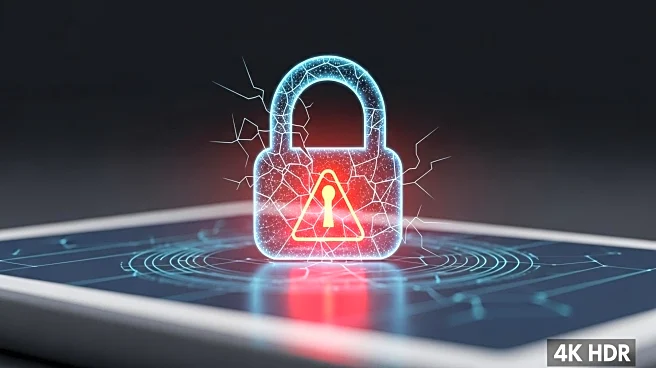What's Happening?
South Korea is experiencing a series of cybersecurity breaches affecting its financial services sector, with significant incidents occurring almost monthly throughout 2025. Notable breaches include a ransomware attack on Seoul Guarantee Insurance in July, which disrupted core systems, and a data breach at Lotte Card between July and August, exposing around 200GB of data and affecting approximately 3 million customers. Additionally, Welcome Financial Group's lending arm, Welrix F&I, suffered a ransomware attack in August, with a Russian-linked group claiming to have stolen over a terabyte of sensitive data. These incidents highlight vulnerabilities in South Korea's digital defenses, exacerbated by a fragmented government response and a shortage of skilled cybersecurity professionals.
Why It's Important?
The repeated cybersecurity breaches in South Korea's financial sector underscore the critical need for robust digital defenses and coordinated government responses. These incidents not only compromise sensitive customer data but also threaten the stability and trust in financial institutions. The breaches reveal systemic issues in South Korea's cybersecurity infrastructure, including a lack of skilled professionals and a fragmented approach to crisis management. The situation poses significant risks to the country's economic stability and could have broader implications for international financial markets, given South Korea's role as a major global economic player.
What's Next?
In response to the ongoing cybersecurity challenges, the South Korean government is implementing comprehensive cyber measures through an interagency plan led by the National Security Office. This initiative aims to create a coordinated, whole-of-government response to cyber threats. Legal changes are also being considered to empower the government to launch investigations at the first sign of hacking, even if companies have not reported incidents. However, concerns remain about the potential for politicization and overreach if too much authority is centralized. A balanced approach, with a central body for strategy and independent oversight, may be necessary to effectively address these challenges.
Beyond the Headlines
The cybersecurity breaches in South Korea highlight deeper issues related to the country's digital infrastructure and governance. The lack of a unified response mechanism and the shortage of skilled cybersecurity professionals create a vicious cycle, hindering the development of proactive defenses. The situation calls for a reevaluation of how cybersecurity is integrated into national infrastructure planning and workforce development. Additionally, the breaches raise ethical concerns about data privacy and the responsibilities of financial institutions in protecting customer information.










